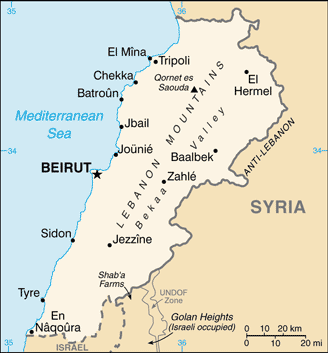Topics Covered
Welcome to Lebanon
Overview of Resources
Metals
Industrial Minerals and Gemstones
Investment
Sources
Welcome to Lebanon
Lebanon is located between Syria and Israel bordering the Mediterranean Sea. The total area of the country is 10,400 km2, and it has a population of 4,140,289 as of July 2012. The country enjoys a Mediterranean climate.
 |
The national flag of Lebanon.
Image Credit: CIA Factbook. |
Lebanon went through a period of civil war between the years 1975 and 1990, which greatly de-stabilized the economy and the country’s infrastructure. Subsequent disputes with Israel and Syria have also affected the country’s progress.
Lebanon has a free-market economic policy coupled with a strong laissez-faire commercial system. The economy thrives on banking and tourism. The GDP of the country was $62.23 billion in 2011.
The natural resources of Lebanon are limited and include limestone, iron ore, and salt. The mining sector is small scale and caters mostly to local needs.
Overview of Resources
In 2010, the mining sector of Lebanon produced industrial mineral commodities as cement, gypsum, aluminum sulfate, lime, limestone, phosphate fertilizer, phosphoric acid, sulfuric acid, and salt. However, it did not produce any metals or mineral fuels. The leading mineral commodity was limestone that was used for cement.
Lebanon’s total exports increased from $4.2 billion in 2009 to $5 billion in 2010.
Pearls and precious and semiprecious gemstones were exported and accounted for 26% of the country’s total exports, while exports of base metals and chemical products accounted for 11% and 7% of the total export value, respectively.

The map of Lebanon. Image Credit: CIA Factbook
Metals
Although Lebanon had a great demand for steel products, the country has not produced any since 2003, when the country’s only rolling mill owned by Consolidated Steel Lebanon S.A.L. closed. Hence the country is dependent on imports from Turkey, Belarus, and Ukraine amounting to 75% and Egypt, Italy, Bulgaria, and Russia amounting to 25%.
Industrial Minerals and Gemstones
Lebanon has a significant on-going diamond trade business involving the countries of the EU, DR Congo, UAE, Sierra Leone, and Tanzania. Rough diamonds worth $117.2 million were exported in 2010.
The main companies involved in Lebanon’s cement production are listed below:
- Ciment de Sibline S.A.L.
- Cimenterie du Moyen-Orient S.A.L.
- Cimenterie National S.A.L.
- Holcim (Liban) S.A.L ( subsidiary of Holcim Ltd. of Switzerland)
- Société Libanaise des Ciments Blancs S.A.L. (subsidiary of Holcim Ltd.).
The increased demand for cement in the country for construction purposes brought about an increase in production from 4.9 Mt in 2009 to 5.2 Mt in 2010. In that year, Cimenterie Nationale was the top producer and exporter of cement with a production capacity of 2.8 million Mt/yr of cement. Société Libanaise des Ciments Blancs produced 100,000 Mt of white cement out of which more than 57% was used locally and 41% was exported to Syria.
Lebanon Chemicals Co. imported phosphate rock by truck from Syria to its Selaata plant where it was used to produce phosphoric acid, single superphosphate, and triple superphosphate. Production statistics for 2010 are as follows:
- 200,000 Mt/yr - phosphoric acid
- 220,000 t/yr - granulated triple superphosphate
- 120,000 t/yr -granulated single superphosphate.
Investment
The Lebanese government is open to foreign investment, but due to improper planning and legislation investors are unwilling to venture into the mining sector.
Experts feel that the construction boom in the country is likely to be the driving force behind the country’s economic growth in the next few years. Political stability and provision of uninterrupted electric energy and natural gas will aid in the expansion of the mineral industrial sector.
Disclaimer: The Author of this article does not imply any investment recommendation and some content is speculative in nature. The Author is not affiliated in any way with any companies mentioned and all statistical information is publically available.
Sources
Disclaimer: The views expressed here are those of the author expressed in their private capacity and do not necessarily represent the views of AZoM.com Limited T/A AZoNetwork the owner and operator of this website. This disclaimer forms part of the Terms and conditions of use of this website.